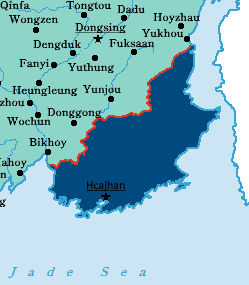Pyinthar
This article is incomplete because it is pending further input from participants, or it is a work-in-progress by one author. Please comment on this article's talk page to share your input, comments and questions. Note: To contribute to this article, you may need to seek help from the author(s) of this page. |
People's Republic of Pyinthar ပြည်သူ့ သမ္မတနိုင်ငံ ပြိန်ထရ (Pyinthari) | |
|---|---|
| Anthem: ကမ္ဘာမကျေ kaba ma kyei "Till the End of the World" | |
 Location of Pyinthar in Abaria | |
| Capital and largest city | Hcajhan |
| Official languages | Pyinthari |
| Recognised regional languages | Thanhliênese Lanhsavanian |
| Ethnic groups (2022) | 62.8% Pyinthari 21.4% Thanhliênese 7.1% Lanhsavanian 5.6% Mylasian 2.6% Yinese 0.5% Other |
| Religion (2022) | 81.2% No religion 6.8% Gregorianism 4.7% Himayan 2.4% Sendou 4% Other |
| Demonym(s) | Pyinthari |
| Government | Unitary one-party socialist republic under a totalitarian military dictatorship |
• Chairman | Hla Htay |
• President | Moe Thiri |
• Prime Minister | Zaw Lin |
| Legislature | People's Assembly |
| History | |
| c. 3000 BCE | |
| 12-23 June 1892 | |
| 7 March 1966-23 November 1981 | |
| 19 April 1974 | |
| 29 December 1985 | |
• Water (%) | 3 |
| Population | |
• 2022 estimate | |
• Density | 100.59/km2 (260.5/sq mi) |
| GDP (PPP) | 2022 estimate |
• Total | |
• Per capita | |
| GDP (nominal) | 2022 estimate |
• Total | |
• Per capita | |
| Gini (2022) | medium |
| HDI (2022) | medium |
| Currency | Shwé (ရွှေ/Ꞩ, PS) |
| Time zone | UTC-5 (Pyinthari Standard Time, PST) |
| Date format | dd-mm-yyyy |
| Driving side | right |
| Calling code | +68 |
| Internet TLD | .py |
Pyinthar (Pyinthari: ပြိန်ထရ; IPA: pjɪ̀ɰ̃.tʰa̰), officially the People's Republic of Pyinthar (Pyinthari: ပြည်သူ့ သမ္မတနိုင်ငံ ပြိန်ထရ; PLCTS: Pyi Thu Samma Da Nain Ngan Pyain-ṭhar), is a small nation located in the southwestern corner of Abaria.
Etymology
The etymology of the word "Pyinthar" is believed to be derived from the ancient Pyinthari words "Pyin" (ပြိန်) and Thar (ထရ). "Pyin" suggested a sort of connection, union, or harmony, with "Thar" implying a further sense of grandeur or significance. Over time, it is believed that these two words conjoined into some vague "Land/People of Harmony," though this particular etymology is disputed.
Alternatively,

